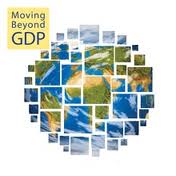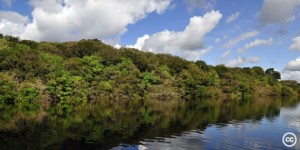Moving Beyond GDP: How to factor natural capital into economic decision-making (WAVES)
Wealth Accounting and the Valuation of Ecosystem Services (WAVES) / June 2012
 According to the WAVES partnership Gross Domestic Product (GDP) is the main tool we use to measure economic activity but it does not measure several important areas such as:
According to the WAVES partnership Gross Domestic Product (GDP) is the main tool we use to measure economic activity but it does not measure several important areas such as:
- Loss of species and ecosystems
- Depletion of natural resources
- Future impacts of climate change such as flooding or lost harvests
- Health costs as a result of pollution
- Depreciation of physical assets such as factories, roads and bridges
Read report
“Our climate is changing, our fisheries are depleted, our soils are degraded, our water supplies are overextended. We now need a measure that goes beyond just the annual output of a country. We need a measure that looks at wealth in its entirety – combining produced, social, human, and, importantly, natural capital.”
Natural capital includes:
- Minerals and energy, timber, agricultural land, fisheries, and water.
- Vital services air and water filtration, flood protection, carbon storage, pollination for crops, and habitat for fisheries and wildlife.
“These values are not readily captured in markets because they are “invisible”, so their contribution to the economy and livelihoods is not recorded. These services are taken for granted and a country does not know what it would cost the economy if these services were lost.”
“Wealth accounting – the balance sheet for a country – is a measure of all the assets that support human well-being. These include produced capital from manufacturing, human capital including the education of people, social capital including entrepreneurship and innovation, and natural capital. Assets like water, forests, and other ecosystems that provide vital goods and services make up a country’s natural capital.”
This will allow policy makers to identify where economic growth is based on damaging the environment (which puts these natural assets at risk of not being available for future generations) and to inform their decisions on areas such as infrastructure and investment priorities e.g. when deciding whether to clear mangroves or clear forest for a road. Economic data can be particularly important to convince finance and planning ministries.
People around the world depend on the environment for their daily livelihoods (food, shelter and income) but this particularly the case in 43 “low-income” countries where natural capital is estimated to be worth 36% of total wealth.
There are numerous examples of countries already applying versions natural capital accounting from Australia to Mexico. See the map on page 18-19 to see which countries have existing or pilot programmes. The majority are in Europe.
 In February 2012 the United Nations Statistical Commission approved the System of Environmental and Economic Accounts (SEEA) which is taking forward work to standardise natural capital accounting using environmental statistics on water, energy, forest, and pollutants. The SEEA will support countries to bring together data for asset accounts (measuring stocks and changes in natural resources and energy in physical and monetary terms), physical flow accounts (how much water, energy and air etc used by economic sector) and monetary accounts (e.g. environmental taxes and subsidies).
In February 2012 the United Nations Statistical Commission approved the System of Environmental and Economic Accounts (SEEA) which is taking forward work to standardise natural capital accounting using environmental statistics on water, energy, forest, and pollutants. The SEEA will support countries to bring together data for asset accounts (measuring stocks and changes in natural resources and energy in physical and monetary terms), physical flow accounts (how much water, energy and air etc used by economic sector) and monetary accounts (e.g. environmental taxes and subsidies).
How to value ecosystem services?
Methodologies are still being consolidated and worked on but there are several options
- Direct use value e.g. individuals get food or visit an area of natural beauty
- Indirect use value e.g. benefits we receive from natural cycles such as pollination
- Option value e.g. putting value on a resource you want to use in the future
- Non-use value e.g. placing an intrinsic value on an ecosystem
The Wealth Accounting and the Valuation of Ecosystem Services (WAVES) is a partnership that is consolidating work on valuing nature (methodology), working to achieve international recognition of the SSEA methods, capacity building for countries seeking to setup natural capital accounts, and facilitating sharing of experiences.
Australia, Canada, Denmark, France, Japan, Norway, Spain, and the United Kingdom are working with Botswana, Colombia, Costa Rica, Madagascar, and the Philippines. Along with UN agencies—UNEP, UNDP, and the UN Statistical Commission. See the partners page for more details.
Read report
————————————
This summary was prepared by Why Green Economy?. The views expressed have been paraphrased. See the original source for more information.

Leave a Reply